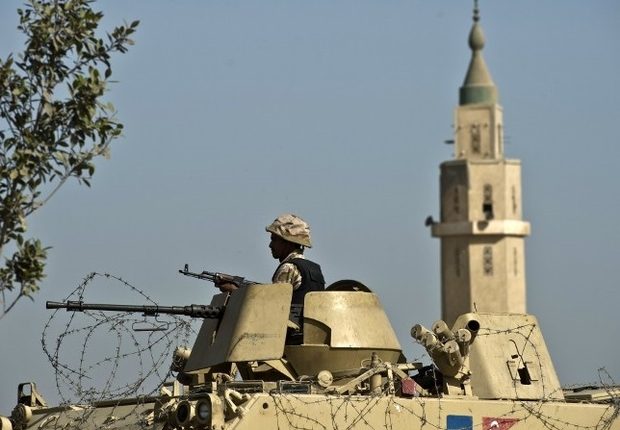
Bashar al-Assad of Syria has stressed that the Egyptian-Syrian relations is improving, adding that the relations have been limited only to military cooperation so far.
In an interview with al-Watan, a Syrian newspaper, al-Assad welcomed Abdel Fattah al-Sisi’s statements on supporting the national Syrian army saying, “We hope that al-Sisi’s statements would be reflected on improving the relations between both countries.”
He added, “We know that the pressure on Egypt have not stopped either from the Western countries who want Egypt to have a marginalized role in a certain direction, or from some Gulf countries -who do not have any history- while they want a country (Egypt) that holds one of the oldest civilizations in the world to be like them.”
He also said that the reason behind preserving the Egyptian-Syrian relations at its lowest level during Mohamed Morsi’s rule in Egypt returns mainly to the fact that the security military institution did not want to sever the ties between the two countries.
Al-Assad also stressed that there are no political negotiations between both parties, saying, “I can say that the relations between both countries are improving gradually but the cooperation is still limited within the security framework.”
Al-Assad said, “There remained a consulate that is working with a minimum staff. After the ousting of the Muslim Brotherhood’s rule, the relation started to improve and it’s still in its improvement process. In this context, came General al-Mamlouk’s visit to Egypt and the latest statements by Egyptian officials, particularly Al-Sisi. However, this is an indication of the improvement of relations, but they have not reached the required level yet”.
It is noteworthy that al-Sisi revealed last November that Egypt supports the Syrian national army in the fight against whom he described as the extreme elements. During his interview with the Portuguese TV network RTP, Al-Sisi expressed support for Syrian Bashar al-Assad’s army.
Al-Sisi said that the Syrian government’s army forces are best positioned to combat terrorism and restore stability in the war-torn nation.
When al-Sisi was asked if he’d send Egyptian peacekeepers to Syria under a peace deal, he said that “it is better that the national army take responsibility” and that his priority is to “support the national army” of Syria.
However, days after Al-Sisi declared his support to Bashar Al-Assad’s army forces, Al-Safir, a Lebanese newspaper close to the Shiite militant group Hezbollah, revealed that an Egyptian unit, including 18 Egyptian pilots started to work at Hamah military airbase in Syria on November 22.
18 pilots were part of a special helicopter squadron operating at Hamah airbase and have been at the base since 12 November, according to the same source.
It is not known if the pilots have already participated in airstrikes or not, but their presence at Hamah airbase shows that there is an Egyptian-Syrian decision to speed up merging the Egyptian pilots.
The first group of four high-ranking Egyptian officers from the Egyptian General Staff entered Syria and were deployed in the Syrian army’s general staff base in Damascus, adding that two Egyptian Major Generals started work in the Syrian army’s operations room a month ago, and their responsibility is leading reconnaissance operations, the latest of which was in Quneitra in Southern Syria, the Golan Heights and Daraa.
Arab sources were quoted saying that Cairo is also studying dispatching its ‘Thunder Forces’ to Syria to help the army more extensively in operations.
It also quoted senior Syrian security sources as saying that the Egyptians have promised Damascus to send their forces to Syria and will start massive participation in battles there on January 23, adding that Cairo’s military presence will go beyond its role in Hama airbase.
It seems that the Egyptian participation with AL-Assad’s army is the fruit of the Egyptian-Syrian communications and efforts during the past weeks after a series of undeclared security meetings between Cairo and Damascus that started weeks ago, according al-Safir.
Last October, a top Syrian intelligence official discussed security coordination with his Egyptian counterpart amid warming ties between the two countries.
Syria’s state news agency SANA reported then that Syrian National Security Bureau chief Ali Mamlouk “made an official visit to Cairo,” where he met with General Khaled Fawzy, the head of Egypt’s General Intelligence Service, as well as other “senior security officials.”
SANA said “The two sides agreed to coordinate political stances,” adding that they also decided to “strengthen coordination in the fight against terrorism.”
In August 2015 Mamlouk, who has served as a diplomatic troubleshooter for the Bashar al-Assad regime, previously traveled to Egypt in August 2015.
Al-Mamlouk was appointed chief of the Syrian National Security Bureau in 2012. He currently supervises all Syrian security apparatuses. Al-Mamlouk’s name is one of several Syrian names listed by imposed E.U. sanctions.
In the same context, Al-Masdar News (AMN), a news site concerned with the Syrian issue, reported that a group of officers from the
Egyptian Army traveled to the port-city of Tartous, Syria to train with Russia’s military advisors near the Islamic State’s front-lines.
Al-Masdar News claimed it quoted some local activists saying that the Egyptian officers were accompanied by Russian military personnel upon their arrival to Tartous.
The latest Egyptian stances and polices have led to major tension with Saudi Arabia -Egypt’s Gulf financial backer since the military coup in 2013.
The Egyptian Saudi relations have soared as both countries are indifference among several regional issues on top them is the Syrian crisis.
At first, the relations between both countries have deteriorated as a result of Egypt’s vote in favor of a Russian-backed draft resolution in the UN Security Council on Syria, which was opposed by Saudi Arabia.
As a result, Egypt’s Gulf backer condemned the vote and described it as a “painful” stance.
After the voting, the Saudi ambassador to the UN, Abduallah al-Mouallimi said, “It was painful that the Senegalese and Malaysian stance was closer to the Arab’s consensus than the Egyptian delegation.”
He also said that he feels pity for these countries that voted for the Russian resolution, stressing that his country will continue backing the Syrian people by all means.
Two days following the voting, Saudi Arabia reacted when the state-owned oil company Aramco announced halting oil product supply to Egypt.
The sudden halt, triggered a scornful media campaign against Saudi Arabia, as it was seen as a political decision. On the other side, Saudi journalists and media men criticized the Egyptian regime and blamed the kingdom or its financial generosity to al-Sisi regime.



